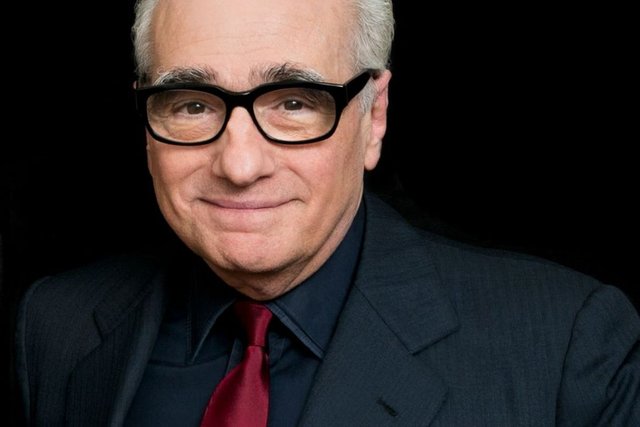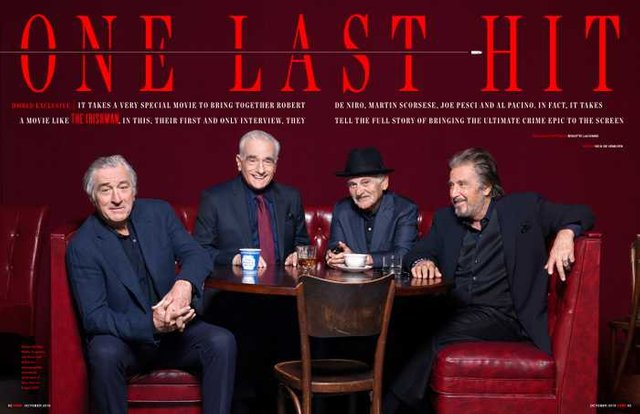For a certain definition of cinema about what Martin Scorsese said.
Do you associate Martin Scorsese's widely commented statement that Marvel ”are not cinema”? I decided not to speak about this because I feel that not only one question is important in interviews but also what is said sooner or later. There are statements that sound completely different during the questions and taken out of context differently. I have the feeling that commenting on one sentence from the entire interview makes little sense.
Anyway, today I bought the October issue of Empire magazine, with the Irishman announcement on the cover. I read the material - not a word about Marvel. I check everything again and it turns out that the interview with the director will not be released until November - which is not there yet because, as you probably all noticed, we have October. Of course, there is a possibility that the entire interview got into the media but I have doubts because all the media I found cite the same one fragment - interestingly - without question - just the director's answer. It doesn't happen that often, that's why there is a tiny conspiracy theory in my head. I have (a bit conspiracy, I don't hide) feeling that this one line of interview got into the media mainly for increasing the sale of Empire (which is mostly dedicated to super hero movies, even if there is nothing particularly interesting about them to say) a little gone up and that the title should be present in the discussion. Especially since I suspect I'm not the only person who thought about checking the entire interview. And now instead of any Empire issue, I will have two at home (I've been buying Empire for years but recently there were so few interesting things in it that I got discouraged).
One line from the interview, commented by creators and actors as well as specialists everywhere, could become the basis of some bizarre war, where the director's remark became the basis for visions - mainly about how much Scorsese envy the success of colleagues who make super heroes productions. An interesting note - many people thought that Scorsese is old and just can't keep up with the cinema. Meanwhile, if we look at the production or technology, then Scorsese willingly reaches for new technologies or opportunities. In his work he used CGI, his latest film made in collaboration with Netflix, has shot the episode of the series for HBO. I don't have the feeling that he was a creator in the ivory tower who did not notice some changes in the world of film. He only differently defines the art of the cinematography that others.
Of the comments that you can find on what we know about the Scorsese interview, I liked Robert Downey Jr. the most, who rightly said that Scorsese should not be regarded as a jealous, bitter old man, because Scorsese really doesn't wake up at night screaming because people go to watch Iron Man. And that different perspectives and ways of defining the medium are needed. I always knew that Downey Jr. he is an intelligent man. At the same time, I am surprised myself how quickly even the artists themselves set themselves on the position of humiliated and aggrieved - as if different opinions about what functions the cinema performs, suddenly become something new. I agree that when Spielberg tries to say that Netflix movies are not the same as cinema movies, his arguments are quite vague. But Scorsese makes it quite clear that he does not undermine the technical side of the film, but for him this way of providing entertainment is more associated with an amusement park than with cinematography trying to touch human nature. The sentence "This is not a cinema" clearly does not mean "These are not physically movies" but "These productions do not meet my definition of what film art is." Translated in this way, it does not sound ridiculous or sensational - it is simply a statement by one artist about a specific genre in cinema.
I honestly admit that Scorsese's statement forced me to reflect and I must say that I did not feel offended at all, as a fan of films about super heroes (which I am undoubtedly). Rather, I think that every artist can define his own field of art for his own needs, this is his right - after all, Scorsese's opinion does not affect the fact that Marvel's films are created. At the same time I also agree that MCU has to the cinema which tries to touch the essence of human as McDonald’s is a restaurant with ambitions. You will eat in both. Bah! Even sometimes there are moments of life when McDonald’s will taste incomparably better. Sometimes you don't feel like anything else. But the philosophy behind both food is completely different. You can call both a restaurant but at the same time - the approach to the material is different. For me, it's similar to MCU movies (not all super hero movies). And I do not blame or pain that someone makes this distinction because I do not feel worse with my movie Bic Mac. What's more, when I eat a Big Mac I have no problem with someone coming and saying that what I eat is not a Big Mac steak. I know what I bought and I know what I like. The fact that different people define cinema experiences differently for their needs does not offend me. It certainly doesn't offend me when the creators do it. Ultimately, being an artist also involves, among other things, constantly looking for a definition of your work.
Which, moreover, brings me to the reflection that we are constantly commenting on issues related to popular culture from certain positions in which you feel a sense of inferiority. Meanwhile, popular culture today is power, and superheroic films are in its very center. We don't have to defend our positions because we are the center. Strength - economic, narrative, technological is now in the hands of those who are making comics adaptations. What's more, there are also indicators of prestige. Black Panther was nominated for an Oscar for best film. Joker, although not belonging to the MCU, won in Venice. It is hard to talk about cinema using comic book inspiration as incomprehensible, pushed to the margins of culture. Cinema based on comic and super heroic narratives is strong on all fronts. Which does not mean that everyone must like it. But the statement is not directed against Scorsese viewers, but against a certain type of cinema thinking.
I have the impression that all too often we treat any reflection on the nature of cinema and its tasks as elite. Meanwhile, I would be afraid of directors who don't ask themselves such questions. Let's be confident enough that it doesn't hurt us that Scorsese sees cinema differently than we do.
Comparing to an amusement park in my opinion is correct because the amusement park has in the first place a vision of how much they will earn if users return to it. It cannot be denied that even if MCU is an amusement park full of emotions and excitement, the first thought of people deciding about productions revolves around how to draw us not only into the world of film but also all products around it. After all, we not only watch movies, we buy gadgets with super heroes, clothes, comics, books, everything we can. A bit like the animated Disney movies and princesses - even if the movies are touching and shape our childhood memories - it's still a big industry - selling everything to girls with Disney princesses. In terms of thinking - what is this film for at all - it is far from "the film is to get to know the nature of human" and the close "film is to draw you into the world where you spend money". Again - it doesn't offend me, because show business has a business element for a reason. However, it seems to me that the discussion of these forms is valuable. Also because the entertainment cinema is becoming more and more homogeneous. And this means that maybe someday you'll want to get out of this car and it turns out that there is nowhere to go.
Personally, I think that Scorsese's statement is treated as a starting point for what the place of genre cinema is, whether cinema should be feared where producers have such a great role, whose vision goes far beyond the vision of specific directors, whether one should ask - what is the future of the center cinema which gives entertainment but also in-depth reflection (after all, recent Scorsese movies were exactly what they were, except maybe a long reflective film about Japanese priests, which to my surprise I really enjoyed). Ultimately, culture is what one talks about, not what one vision of the world is established in advance. MCU in the world of Martin Scorsese is not cinema. In my it's specific cinema. Maybe in your world is the most fully fledged cinema. But if we are to talk about cinema, then we should probably all say aloud what we think and wonder what this cinema is, what it is not and what it should be. These discussions are as old as cinematography itself, and it would be sad if they stopped just because we don't like to hear that someone does not like super hero production.
Ps: I am still not convinced that I am speaking about a real Scorsese statement because I will be able to talk about it only after I read the entire interview with the director. It may turn out that the context of the speech will change a lot.



